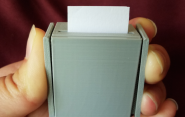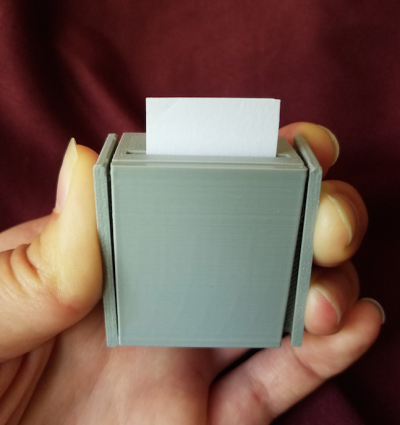Students' Engineering Skills Help with Mental Health

Social isolation and countless Zoom meetings can be tough, so a group of engineering students are working to make things a little easier for their classmates.
As part of the SEAS 2020 Summer Design/Research Scholars, a team of students are working on a series of devices and a website to help students who are struggling with mental health issues. It started with a project that Serena Riddle ’21 began in the spring semester as part of the Computer-aided Engineering course. It’s a device that emits cards, each one with its own prompt - “go for a walk” or “call a friend,” for example - that breaks the user out of a negative thought cycle. At that point, the pandemic was still in its very early stage, and “social distancing” wasn’t yet a common phrase. 
By summer, she decided to continue working on it. She teamed up with Kristen Henry ‘21 and Lauren Lo Coco ’21, and they joined the summer program, which was designed specifically around the unique circumstances that students face this year. Ronald Adrezin, who taught the three students in Computer-aided Engineering, is working as their mentor in the program. Although the project started as a single device, the team has expanded their aims significantly.
“It’s actually blossomed into a whole student-led mental health initiative,” Riddle said. “Our mission is to become an extracurricular group at Yale, a group of students committed to raising awareness about mental health. We also want to bring people out of the shadows, because a lot of people struggle in silence, and also to equip people to take care of each other.”
The team is working on a series of different devices, plus a website that will serve as a hub for these devices and point students to mental health resources on campus. Two Computer Science students, Tom Coile ‘21 and Ivy Fan ‘21, joined the team are working on a platform designed to ease “Zoom fatigue.” It’s a digital tool that will help students meet up in ways that don’t involve staring at their screens - perhaps scheduling a socially distanced event outside, or working on a puzzle together online.
“It provides people with a way to make new connections and deepen their relationships outside of the digital world,” Riddle said. “We don't want people to say ‘I’m tired of Zoom calls - I'm just going to retreat into my room.’”
Adrezin said the students came into the internship program with a clear idea of what they wanted to do.
“They’re always well-prepared, they always have work to show and it’s been just a fantastic experience,” he said.
The team has further expanded to include Gaby Branin ‘21 and Matt Sutermeister '21. The seven students have been working well together over Zoom these past few weeks. Riddle, Henry, and Lo Coco each have 3D printers at their homes, so they’re able to prototype their devices together and test them out.
Ideally, Henry said, the team will be ready this fall to help struggling students to feel a sense of community. “We hope that our engineered tools will bring people together and help to reduce some of the stigma that still surrounds mental health,” she said.
Like a lot of students this year, Henry’s summer internship fell through due to COVID-19. She was determined to not let the summer go to waste, though, so she turned to Adrezin and asked if he’d be willing to mentor the team.
“I wanted to put the knowledge I learned in his computer-aided engineering class to good use,” she said. “Professor Adrezin has been a great mentor throughout the project and our team is extremely grateful to have the opportunity to learn from his experience.”

